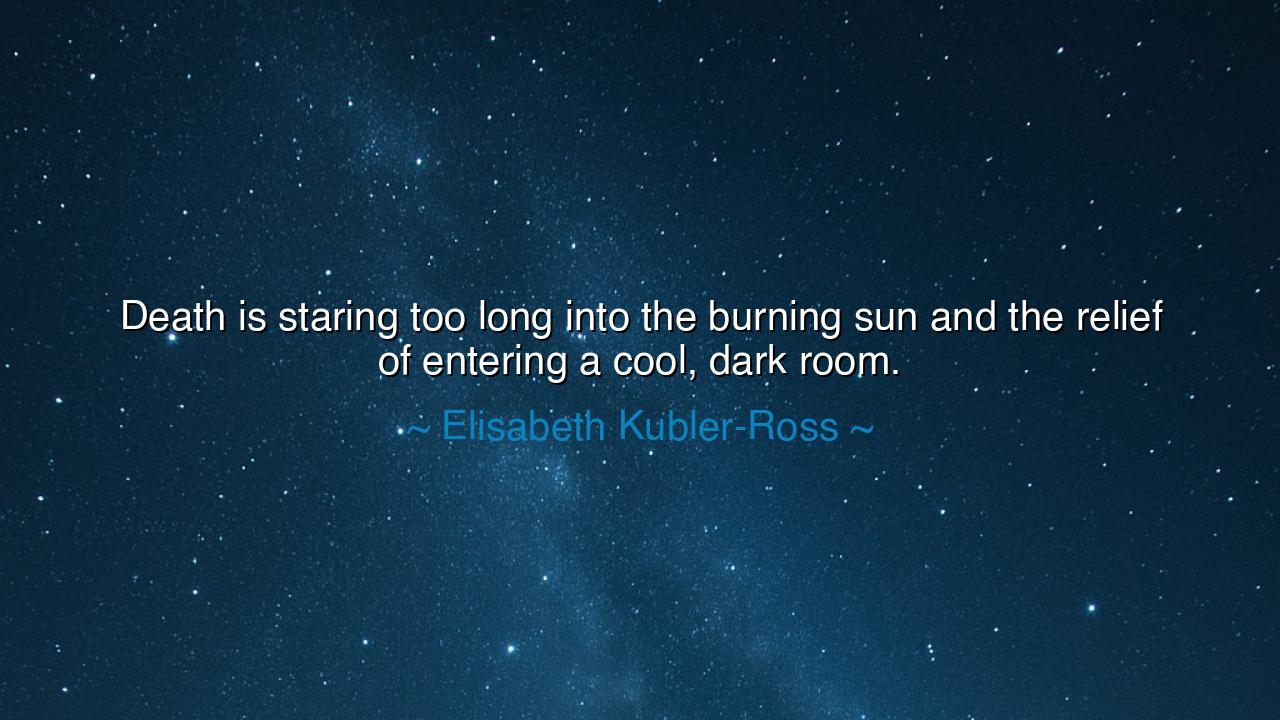
Death is staring too long into the burning sun and the relief of
Death is staring too long into the burning sun and the relief of entering a cool, dark room.






Death—that mysterious force that we all face, though few of us understand it fully—has always stirred the hearts of men. It is a transition, a crossing from one world to another, a departure from the warmth of the living to the unknown, cold and dark. Elisabeth Kübler-Ross, in her profound wisdom, speaks of this transition when she says, “Death is staring too long into the burning sun and the relief of entering a cool, dark room.” These words offer an image so striking that we feel the weight of them deep within our souls. In them lies the essence of human suffering, release, and the peace that follows when the struggle ends.
To stare too long into the burning sun is to endure the searing pain of life, the trials and tribulations that scorch our spirit, leaving us weary and broken. It is to be caught in a world of suffering, where the light is too much to bear, where every step we take is like walking through a furnace. We all know this feeling: the weight of grief, loss, or sickness, that overwhelming force which blinds us and fills our hearts with yearning for relief. The sun, which once offered warmth and life, now becomes an instrument of torture, its rays cruel and unyielding. And in the moment of this unbearable suffering, we may long for the darkness—the quiet reprieve that promises rest.
And then, when the burning sun becomes too much to endure, there is the relief of entering a cool, dark room—a sanctuary, a place of peace and quiet, where we are free from the burning heat and harsh light. Here, in the darkness, there is no more pain, no more struggle; there is only stillness and calm. Kübler-Ross’s metaphor evokes the final release that death brings: an end to suffering, an escape from the blinding light of life’s trials. The dark room symbolizes the peace that comes after the storm, the cool relief that waits for us at the end of a long journey.
This image of death as relief has long been shared by the wise throughout history. The ancient philosophers, such as Socrates, spoke of death not as a thing to fear, but as a passage to something greater. For Socrates, death was the final release from the hardships of life, a transition to something eternal and untroubled. He embraced his death with a calm acceptance, for he understood that suffering in life is inevitable, but it is also transitory. Much like Kübler-Ross’s metaphor, death, in Socrates’ view, was the doorway through which one finally found peace.
Consider also the story of Siddhartha Gautama, who became the Buddha. Born into luxury and shielded from suffering, he was struck by the truth of life’s pain when he encountered illness, aging, and death for the first time. This revelation led him to seek the path of enlightenment—a journey through suffering to the ultimate relief of liberation. Through meditation, he discovered that suffering is inherent in life, but it is the cessation of suffering that leads to true peace. In a similar way, death, as Kübler-Ross suggests, is the final relief after a life lived in the burning sun of strife.
Thus, the lesson of Kübler-Ross’s words is profound. Death is not merely the end of life, but a release from all the burdens we carry. It is the moment when the scorching heat of the sun finally gives way to the cool embrace of darkness. For those who are suffering, the end is not something to fear, but a relief that brings peace. We must not fear the darkness, for it is the final rest that we all seek. Like the weary traveler who finds shelter after a long journey, death offers us rest from the struggle of life.
In our own lives, we must learn to accept that suffering is a part of the journey, just as the sun is a part of the day. But we must also remember that there is peace beyond the pain. Kübler-Ross’s metaphor teaches us that death is not to be feared but understood as a natural conclusion to the path we walk. In the end, as we strive to live with love, compassion, and understanding, we should hold on to the truth that death is not an enemy, but a friend who leads us to a place of cool, quiet rest. Let us live with courage, knowing that, like the burning sun, our struggles will eventually end, and the relief of the dark room will follow.






AAdministratorAdministrator
Welcome, honored guests. Please leave a comment, we will respond soon